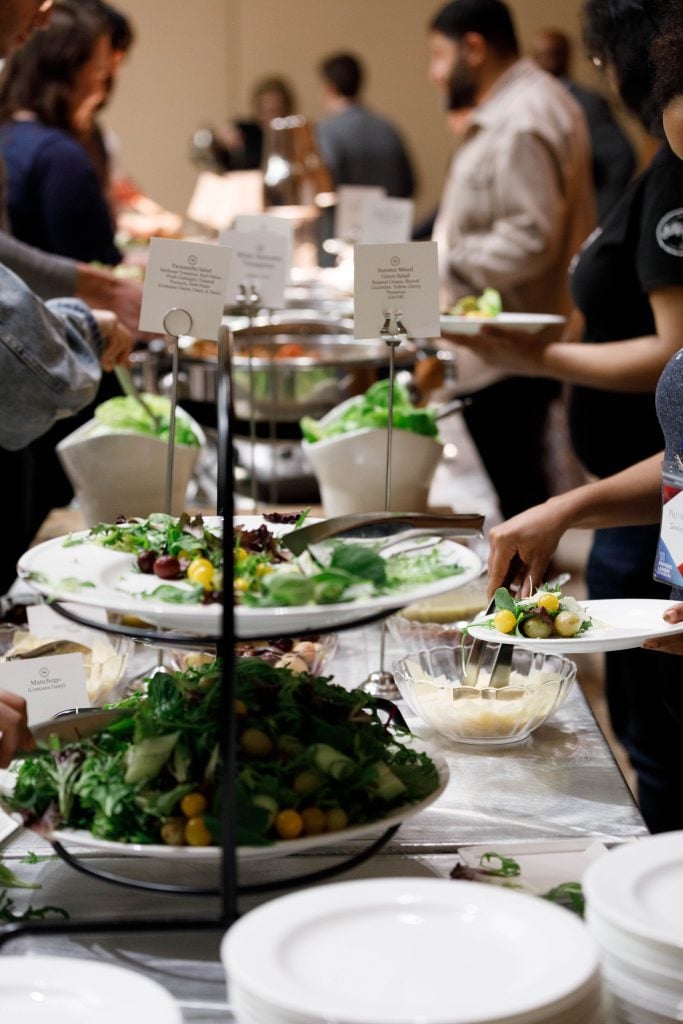Tool
Guide to Hosting Faith Friendly Events
Being an interfaith leader doesn’t mean you need to know everything about every tradition, but you do need to be mindful of certain considerations when planning an inclusive event.

Faith Friendly Events
The interfaith movement intentionally represents and brings together people from many different religious and ethical backgrounds. By creating a safe and welcoming space for all worldviews, you both showcase the value of these identities and empower yourself and others to make interfaith cooperation a reality.
Here are some helpful tips to keep in mind when organizing your event:
Calendar & Holidays
When planning an interfaith event, timing is everything. Scheduling events on yearly holidays or weekly days of observance will limit who can attend your event.
Before beginning to plan, make sure you look at a calendar and do your best to avoid holidays celebrated by those who you would like to invite. Commonly celebrated holidays include: Roman and Orthodox Christmas, Diwali, Roman and Orthodox Easter, Eid-al-Adha, Eid-al-Fitur, Holi, Pesach, Rosh Hashanah, Samhain, and Yom Kippur. This list is far from exhaustive, and you should always work to accommodate individual needs. Moreover, this list will not be relevant to every group—an event put on to bring members of Hindu and Muslim congregations together is unlikely to benefit from avoiding Christmas, for example. Here is a handy interfaith calendar to refer to in your planning.
On a weekly basis, be aware of scheduling conflicts that might leave people out. Many Muslims attend Friday evening prayers, and many Jews begin Sabbath observance around the same time. Many Christians attend church on Sunday mornings. Events on Friday, Saturday, or Sunday should pay particular attention to time of day so your event doesn’t conflict with a religious service.

Food
If there’s one thing that brings people together, it’s food. Being aware of dietary requirements is crucial to making sure your events are inclusive. When providing food at an event, be conscious of religious obligations— such as keeping kosher for some Jews, following halal for some Muslims, or eating vegetarian for many Jains, Buddhists, and Hindus. Also, some people restrict their diet during certain times and holidays. Muslims fast while the sun is up on Ramadan, Jews fast on Yom Kippur, Catholics may fast on Ash Wednesday and avoid meat on Fridays during lent, and Orthodox Christians may fast on specific days throughout the liturgical calendar.
There are a few best practices to keep in mind when choosing food for interfaith events. Firstly, make sure that you have vegetarian and vegan options available, and that utensils are not shared between meat and vegetarian dishes. Good vegetarian options will accommodate the vast majority of attendees. Secondly, be sensitive to communities that restrict alcohol. Many people avoid it for religious or ethical reasons, and alcohol-centric events may not be welcoming to those guests. Avoid foods that have been prepared with alcohol, as some religious groups will not consume dishes containing it even if the intoxicant has been cooked out. Ensure that there are ample non-alcoholic beverage options available.
Lastly, don’t hesitate to ask your guests what they need. While vegetarian food will accommodate most people, others may have more specific needs. For instance, some Jains avoid consuming root vegetables because harvesting them kills the plant. It is wise to include a space to express any dietary needs on an RSVP form, or to simply ask individuals with specific needs how you can best accommodate them. Taking others’ dietary needs seriously conveys respect for them and their beliefs.

Social Setting
Consider your goals, attendees, and their needs before making too many plans. Here are some examples of what keeping religious practice in mind can look like:
- (Tradition members) tend to dress conservatively. Will spending a lot of time outside be too warm for them?
- (Day) is a fast day for (tradition). Could we reschedule or ensure that we’re not walking around a lot?
- (Group) will be preparing for (holiday) during that time. Is there a different week that works?
- Are questions worded so that an Atheist or Agnostic can also participate the same as anyone else?
- Conservative (tradition members) generally don’t shake hands with unrelated members of the opposite sex. Perhaps co-ed rugby isn’t the ice breaker for us.
In addition to making sure your events are comfortable for people from different religious and non-religious backgrounds, also be sure to consider how attendees will positively engage each other. For example, conversation cards on tables or planned activities can help participants engage each other.
There’s no tool out there that can tell you everything you want to know about every tradition. You’ll inevitably run into something you don’t know about, and when that happens, the best policy is just to be honest about that and ask a lot of questions. Still, you may want to do some research on your own.

Here are some great sources to check out for further information on interfaith work:
Interfaith America Magazine
Interfaith America’s Magazine broadcasts news and stories of interfaith cooperation across the U.S.
Interfaith Literacy Quiz
Religious diversity is woven throughout the fabric of our history. Take this fun quiz to test your own knowledge of American religious history.
The Pluralism Project
The Pluralism Project has put together great guides and internet resources about all different faiths within the United States.
State of Formation
State of Formation collects the works of young scholars around issues relating to current interfaith work.